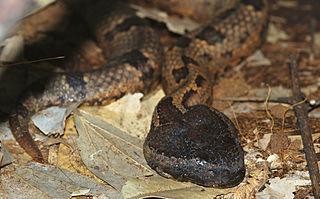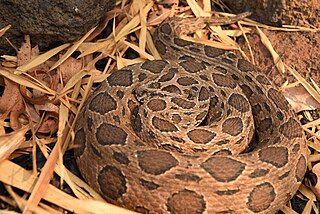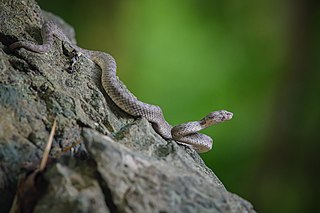
Trimeresurus is a genus of venomous pit vipers found in Asia from the Indian Subcontinent throughout Southeast Asia, China, and the Pacific Islands. Currently 44 species are recognized. Common names include Asian palm pit vipers, Asian lanceheads, and green pit vipers.

Ovophis monticola, commonly known as the Chinese mountain pit viper, is a venomous pitviper species found in Asia. Currently, two subspecies are recognized, including the nominate subspecies described here. Recent taxonomic work suggests that most of these should be considered as separate species. IUCN has already evaluated O. m. makazayazaya as Ovophis makazayazaya.

Protobothrops mucrosquamatus is a venomous pit viper species endemic to Asia. Common names include: brown-spotted pit viper, Taiwanese habu and pointed-scaled pit viper. No subspecies are currently recognized. The species was first described by Theodore Cantor in 1839.

Trimeresurus albolabris, the white-lipped pit viper or white-lipped tree viper, is a venomous pit viper species endemic to Southeast Asia.

Trimeresurus purpureomaculatus is a venomous pit viper species native to India, Bangladesh and Southeast Asia. Common names include: mangrove pit viper, mangrove viper, and shore pit viper.

Calloselasma is a monotypic genus created for a venomous pit viper species, Calloselasma rhodostoma, which is endemic to Southeast Asia from Thailand to northern Malaysia and on the island of Java. No subspecies are currently recognized.

Ovophis is a genus of venomous pit vipers found in Asia. Seven species are currently recognized.

Tropidolaemus wagleri, more commonly known as Wagler's pit viper, is a species of venomous snake, a pit viper in the subfamily Crotalinae of the family Viperidae. The species is endemic to Southeast Asia. There are no subspecies that are recognized as being valid. It is sometimes referred to as the temple viper because of its abundance around the Temple of the Azure Cloud in Malaysia.

Daboia siamensis is a venomous viper species, which is endemic to parts of Southeast Asia, southern China and Taiwan. It was formerly considered to be a subspecies of Daboia russelii, but was elevated to species status in 2007.

The wildlife of Cambodia is very diverse with at least 162 mammal species, 600 bird species, 176 reptile species, 900 freshwater fish species, 670 invertebrate species, and more than 3000 plant species. A single protected area, Keo Seima Wildlife Sanctuary, is known to support more than 950 total species, including 75 species that are listed as globally threatened on the IUCN Red List. An unknown amount of species remains to be described by science, especially the insect group of butterflies and moths, collectively known as lepidopterans.

The wildlife of Malaysia is diverse, with Malaysia being a megadiverse country. Most of the country is covered in rainforest, which hosts a huge diversity of plant and animal species. There are approximately 361 mammal species, 694 bird species, 250 reptile species, and 150 frog species found in Malaysia. Its large marine territory also holds a great diversity of life, with the country's coastal waters comprising part of the Coral Triangle.

Craspedocephalus trigonocephalus, the Sri Lankan pit viper, Ceylon pit viper, Sri Lankan green pitviper or locally, pala polonga, is a venomous pit viper species endemic to Sri Lanka. No subspecies are currently recognized.

Ovophis okinavensis, commonly known as the hime habu (ヒメハブ), Ryukyu Island pit viper, and the Okinawan pitviper, is a venomous pitviper species found in the Ryukyu Islands of Japan. No subspecies are currently recognized.

Trimeresurus kanburiensis is a species of pit viper found in only a few areas of Thailand. Common names include: Kanburi pitviper, Kanburian pit viper, and tiger pit viper. Highly venomous, it is an arboreal but heavily built species with a brown or tawny coloration. No subspecies are currently recognized.

Craspedocephalus puniceus is a venomous pit viper species endemic to Southeast Asia. Common names include: flat-nosed pitviper, flat-nosed pit viper, and ashy pit viper. No subspecies are currently recognized.
Garthius chaseni, commonly known as Chasen's mountain pit viper, Chasen's tree viper, and the Kinabalu brown pit viper, is a species of venomous pitviper in the family Viperidae. The species is endemic to the island of Borneo in Malaysia. No subspecies are currently recognized. It is monotypic in the genus Garthius.
Protobothrops kelomohy, the Omkoi lance-headed pit viper, is a species of venomous snake in the genus Protobothrops found in Thailand.













